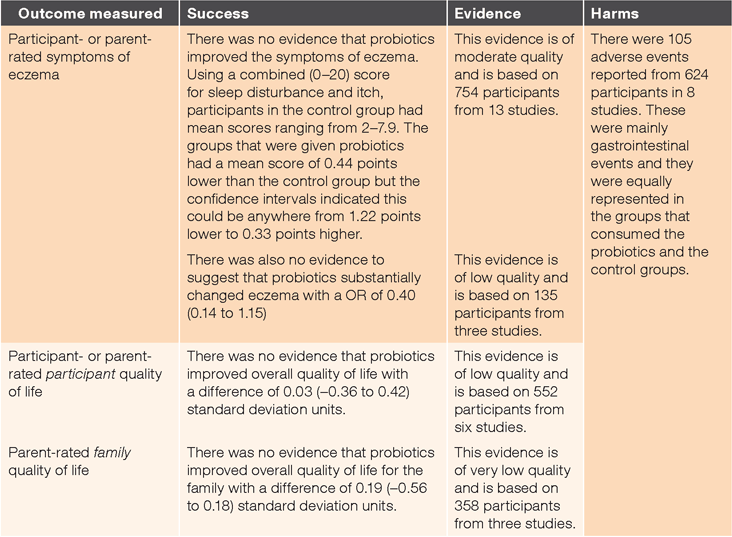Probiotics: make little or no difference in patient rated symptoms for eczema
Vanessa Jordan1 New Zealand Cochrane Fellow, University of Auckland, Auckland, New Zealand
Correspondence to: Vanessa Jordan. Email: v.jordan@auckland.ac.nz
Journal of Primary Health Care 10(4) 352-353 https://doi.org/10.1071/HC15938
Published: 19 December 2018
Journal Compilation © Royal New Zealand College of General Practitioners 2018.
This is an open access article licensed under a Creative Commons Attribution-NonCommercial-NoDerivatives 4.0 International License.
Cochrane review: Makrgeorgou A, Leonardi-Bee J, Bath-Hextall FJ, Murrell DF, Tang MLK, Roberts A, Boyle RJ. Probiotics for treating eczema. Cochrane Database of Systematic Reviews 2018; 11: CD006135. doi:10.1002/14651858.CD006135.pub3
Background: Eczema is a common skin disease affecting up to 25% of children and 2–3% of adults.1 There is currently no known cure for eczema but there are a wide range of treatments available to relive symptoms. Probiotics have been suggested as a potential treatment for eczema. Low microbial diversity in the neonatal period is associated with the development of eczema in the first year of life.2 Probiotics are proposed to influence the gut microbiome and potentially may improve the symptoms and signs of eczema.3
Clinical Bottom Line: This Cochrane review showed that using probiotics probably makes little or no difference to eczema symptoms as reported by parents or sufferers of eczema. Probiotics also may make no difference to quality of life of sufferers or their families. However, there is currently no evidence to suggest probiotics cause any adverse effects either. Authors of this review also did a trial sequential analysis to determine the influence of future studies and showed that these results are unlikely to change with future research.4

|
References
[1] Eichenfield LF, Wynnis LT, Chamlin SL, et al. Guidelines of care for the management of atopic dermatitis: section 1. Diagnosis and assessment of atopic dermatitis. J Am Acad Dermatol. 2014; 70 338–51.| Guidelines of care for the management of atopic dermatitis: section 1. Diagnosis and assessment of atopic dermatitis.Crossref | GoogleScholarGoogle Scholar |
[2] Ismail IH, Oppedisano F, Joseph SJ, et al. Reduced gut microbial diversity in early life is associated with later development of eczema but not atopy in high-risk infants. Pediatr Allergy Immunol. 2012; 23 674–81.
| Reduced gut microbial diversity in early life is associated with later development of eczema but not atopy in high-risk infants.Crossref | GoogleScholarGoogle Scholar |
[3] Simonyte Sjödin K, Vidman L, Rydan P, West CE. Emerging evidence of the role of gut microbiota in the development of allergic diseases. Curr Opin Allergy Clin Immunol. 2016; 16 390–5.
| Emerging evidence of the role of gut microbiota in the development of allergic diseases.Crossref | GoogleScholarGoogle Scholar |
[4] Makrgeorgou A, Leonardi-Bee J, Bath-Hextall FJ, et al. Probiotics for treating eczema. Cochrane Database Syst Rev. 2018; 11 CD006135


